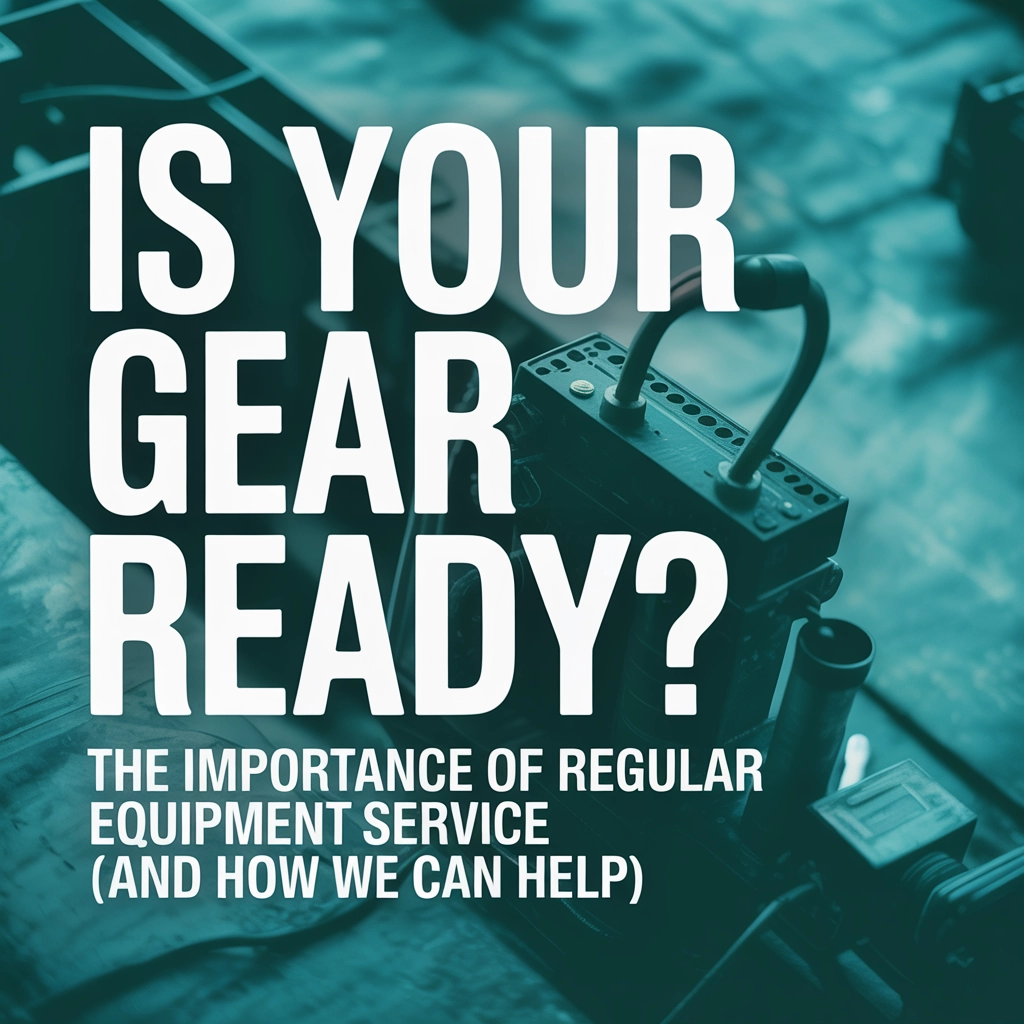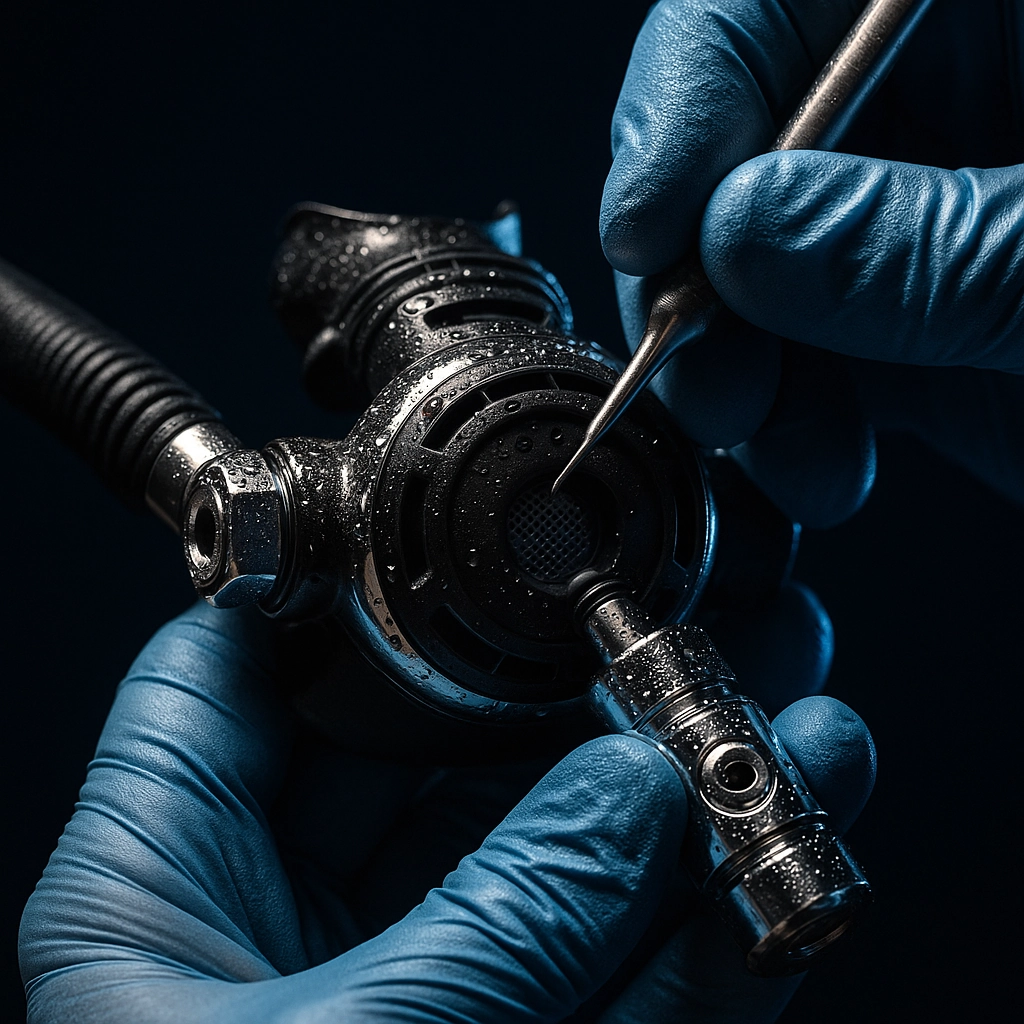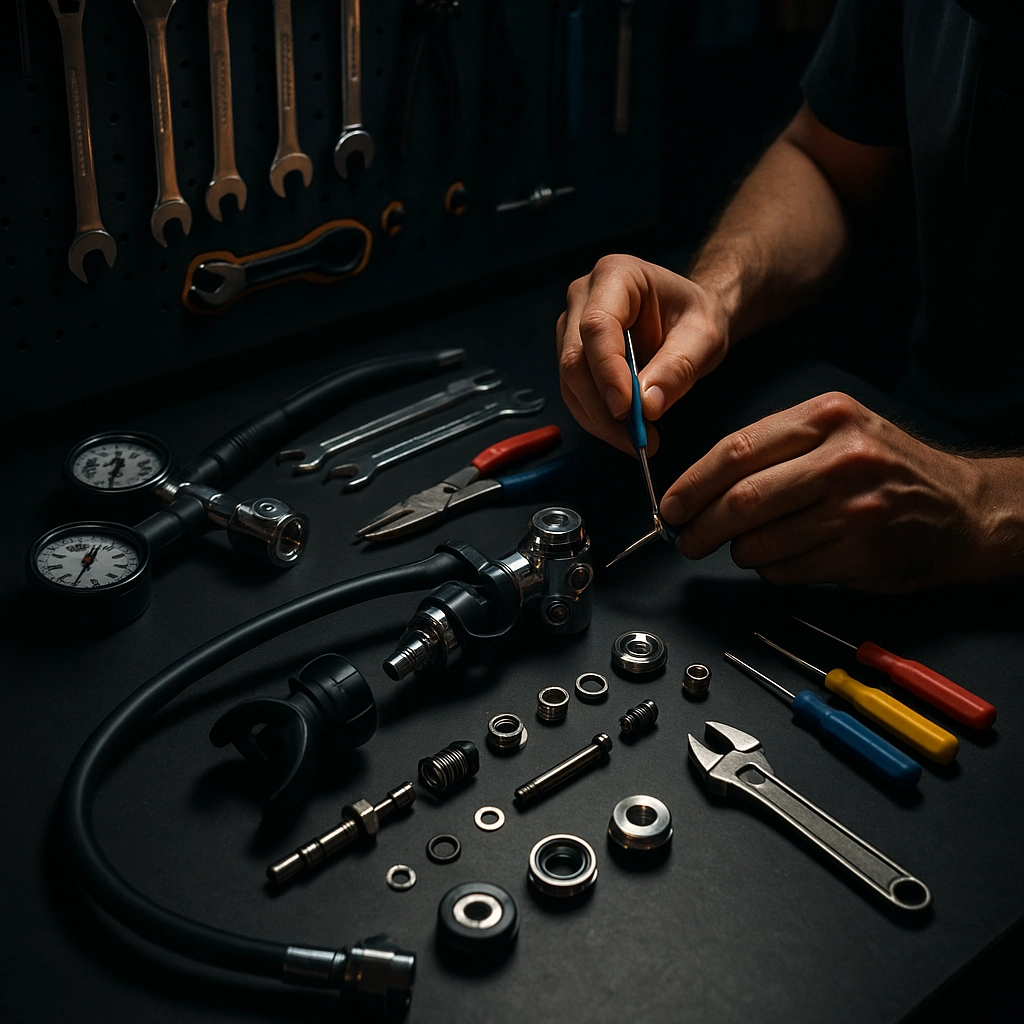Is Your Gear Ready? The Importance of Regular Equipment Service
Zach Haddock Jul 24, 2025
Is Your Gear Ready? The Importance of Regular Equipment Service (And How We Can Help)

When Was Your Last Gear Service?
Picture this: You're 60 feet underwater at Beaver Lake, enjoying the peaceful weightlessness of a perfect dive. Suddenly, your regulator starts making a concerning noise, or your BCD doesn't inflate properly. Not an ideal situation, right? This scenario isn't meant to scare you, but to highlight something we've seen happen too many times – equipment failure due to overlooked maintenance.
At The Dive Shop Kansas City, we believe your scuba equipment is more than just gear – it's your life support system underwater. Just like you wouldn't skip maintenance on your car's brakes, your dive equipment deserves regular professional attention to keep you safe and diving confidently.
Why Regular Service Matters (More Than You Might Think)
Scuba equipment is unique – it sits unused for weeks or months, then gets subjected to harsh environments including saltwater, pressure changes, and sometimes extreme temperatures. This combination creates the perfect storm for silent deterioration that might not be obvious until you're relying on that equipment underwater.
Safety First (Always)
The most compelling reason to maintain your gear is straightforward: your safety depends on it. Regulators that deliver improper air flow, BCDs with leaky inflators, or tanks with compromised valves can all lead to dangerous situations underwater. Regular service identifies potential issues before they become emergencies.
When professional technicians inspect your equipment, they're looking for things the average diver might miss – microscopic cracks in hoses, deteriorating O-rings, or subtle changes in regulator performance that could indicate bigger problems on the horizon.

Protecting Your Investment
Quality scuba gear represents a significant investment. A full set of equipment can easily cost several thousand dollars. Regular maintenance doesn't just keep you safe – it protects that investment by dramatically extending the life of your gear.
Consider this: a properly maintained regulator can last 10-15+ years, while one that's neglected might need replacement in just 3-5 years. The same applies to BCDs, computers, and other critical components. The math is simple – spending a little on regular service saves a lot on premature replacements.
Performance You Can Trust
There's a noticeable difference between diving with freshly serviced equipment and gear that's been sitting in storage for years. Properly maintained regulators breathe easier, BCDs respond more predictably, and dive computers display accurately. This translates to more comfortable, confident, and enjoyable dives.
What Needs Service (And When)
Different components of your scuba kit have different service requirements. Here's a simplified breakdown:
Regulators: Your Critical Lifeline
Your regulator is arguably the most critical piece of life support equipment you own. It's also one of the most complex, with multiple moving parts, seals, and precision components.
Recommended service interval: Annual inspection and service, regardless of use. If you're a frequent diver (25+ dives per year) or dive in challenging conditions (cold water, silty environments), consider more frequent checks.
Warning signs: Difficulty breathing, unusual sounds (hissing, rattling), visible damage to hoses, free-flowing, or leaking from the second stage.
BCDs: Your Buoyancy Control Device
Your Buoyancy Control Device does more than just hold your tank – it's your primary buoyancy control system underwater and, in emergencies, your quickest way to the surface.
Recommended service interval: Annual inspection, with full service every 1-2 years depending on use.
Warning signs: Leaking air (even slowly), sticky inflate/deflate buttons, corroded or stiff dump valves, or visible damage to the bladder.

Tanks: Under Pressure
Scuba tanks seem simple but require serious attention. They're pressure vessels operating at up to 3,000 PSI, making proper maintenance non-negotiable.
Recommended service interval:
- Visual inspection (VIP): Annually
- Hydrostatic testing: Every 5 years
- Valve service: Every 1-2 years or when issues arise
Warning signs: Valve leaks, excessive external corrosion, unusual sounds when filling, or difficulty turning the valve on/off.
Dive Computers: Your Digital Dive Manager
Modern dive computers are sophisticated devices that track everything from depth and time to decompression obligations.
Recommended service interval: Battery replacement as needed (typically 1-2 years), manufacturer check-up every 2 years, and pressure sensor testing every 1-2 years.
Warning signs: Erratic readings, screen issues, battery alerts, or water ingress.
Other Equipment: Don't Forget These
- Wetsuits/Drysuits: Check seals, zippers, and material integrity before every season
- Fins and Masks: Inspect for cracks and strap integrity annually
- Lights and Cameras: Test functionality and check O-rings before each dive trip
Signs Your Gear is Crying for Help
Beyond the specific warning signs mentioned above, here are some universal red flags that should send you straight to our service department:
- Visible corrosion on any metal parts
- Stiff or brittle hoses that have lost their flexibility
- Equipment that "just doesn't feel right" (trust your instincts!)
- Gear that's been stored for 1+ years without use
- Any equipment that's been flooded with water (especially electronics)
- Gear that's been dropped or impacted significantly
Remember, some issues aren't visible to the naked eye. Just because equipment "looks fine" doesn't mean it's functioning optimally underneath the surface.
How We Help Keep You Diving Safely
At The Dive Shop Kansas City, we're more than just a retail store – we're your partners in dive safety. Our service department is staffed by technicians who are factory-trained on multiple brands and passionate about proper equipment maintenance.
Our Service Process
When you bring your gear to us, here's what happens:
- Initial Assessment: We examine your equipment and discuss any concerns you've noticed
- Disassembly and Inspection: Complete breakdown of components for thorough examination
- Cleaning: Removal of salt, minerals, and contaminants from all parts
- Parts Replacement: Swapping out worn O-rings, seats, and other components as needed
- Reassembly and Testing: Careful rebuilding followed by rigorous testing
- Final Inspection: Multi-point checks to ensure everything meets manufacturer specifications
- Documentation: Detailed service records maintained for future reference

Service Plans That Make Maintenance Easy
We offer several service options to fit different diving habits:
- Annual Service Plan: Perfect for recreational divers who want to simplify their maintenance schedule
- Pre-Trip Inspections: Quick check-ups before your dive vacation for peace of mind
- Comprehensive Overhauls: Complete rebuilds for equipment that's been neglected or is heavily used
- Emergency Service: Quick turnaround when you need it most
The Benefits of Local Service
While there are mail-in service options available, bringing your gear to us offers distinct advantages:
- Face-to-face consultation with technicians who understand your specific diving habits
- Faster turnaround without shipping delays
- Immediate testing if needed
- Building a relationship with the people who maintain your life-support equipment
- Supporting your local dive community
Maintenance Between Services: What You Can Do
Professional service is essential, but there's plenty you can do between visits to keep your gear in top condition:
- Rinse thoroughly after every dive (especially in saltwater)
- Store properly in a cool, dry place away from direct sunlight
- Avoid extended storage with batteries installed
- Exercise moving parts periodically (like regulator purge buttons)
- Inspect visually before each dive trip
- Address small issues before they become big problems
The Cost of Waiting: A Reality Check
Some divers postpone service to save money, but this approach usually backfires. Here's why:
- Minor issues become major repairs: What might have been a simple O-ring replacement can turn into a complete overhaul if neglected
- Equipment failure at inconvenient times: Nothing ruins a dive trip faster than equipment problems
- Shorter equipment lifespan: Neglected gear simply doesn't last as long
- Potential safety risks: The cost of medical treatment for a dive accident far exceeds maintenance expenses
Make Equipment Service a Priority
As divers, we spend countless hours researching new dive destinations and planning adventures. Shouldn't we invest the same attention in the equipment that keeps us alive underwater?
At The Dive Shop Kansas City, we're committed to helping you get the most out of your diving investment through proper maintenance. Whether you purchased your gear from us or elsewhere, our service department is ready to help keep you diving safely and confidently.
Ready to get your gear checked out? Stop by the shop, give us a call at (913) 677-3483, or visit our website at https://kcdiveshop.com to schedule your next service appointment. Your future self – especially the underwater version – will thank you.
Remember: The best dive is always a safe dive, and properly maintained equipment is the foundation of dive safety.
